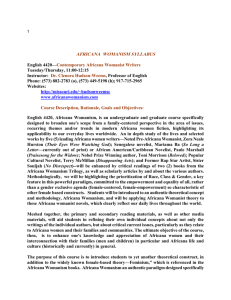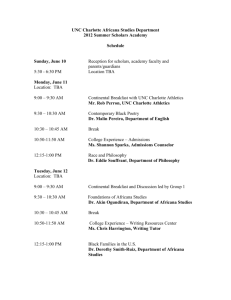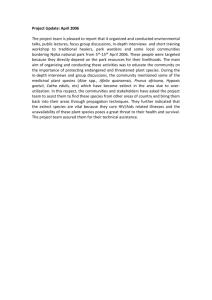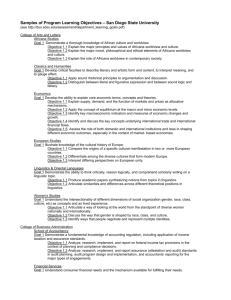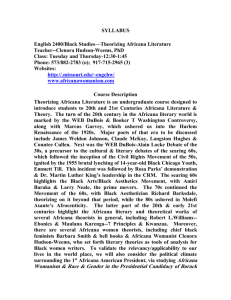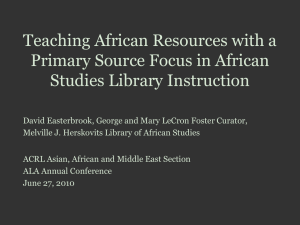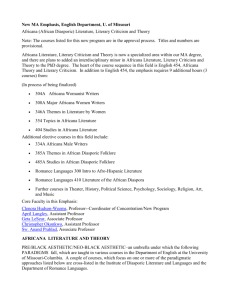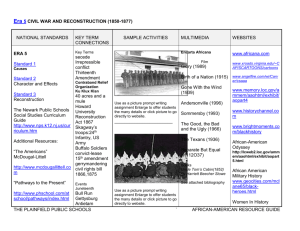syllabus - University of Missouri
advertisement
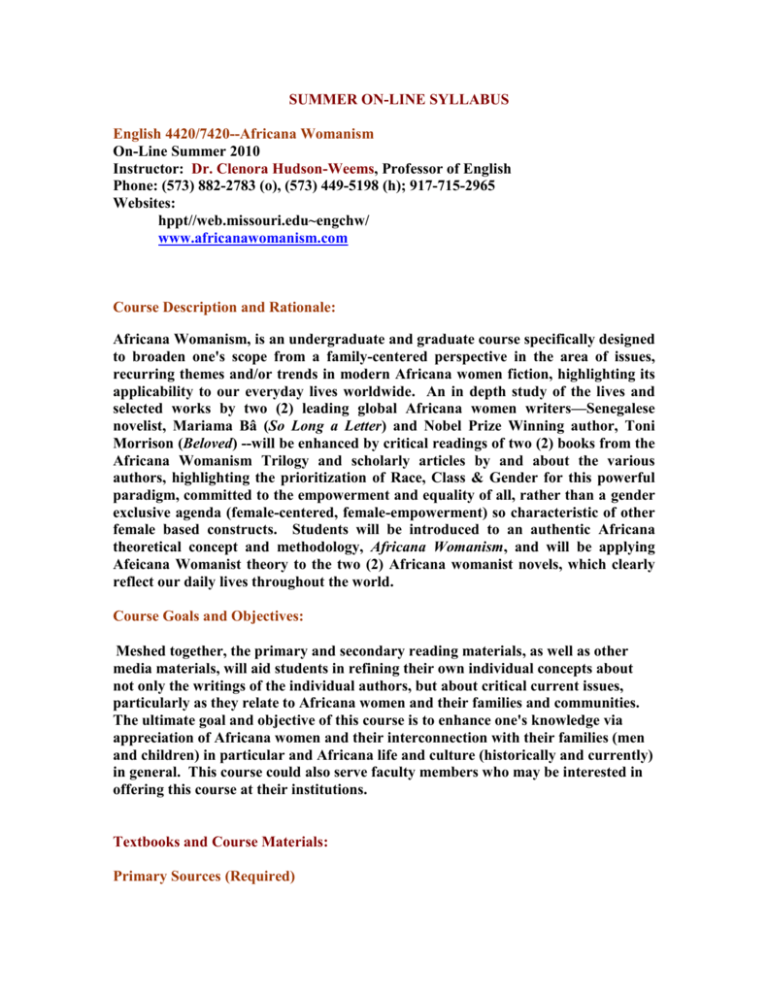
SUMMER ON-LINE SYLLABUS English 4420/7420--Africana Womanism On-Line Summer 2010 Instructor: Dr. Clenora Hudson-Weems, Professor of English Phone: (573) 882-2783 (o), (573) 449-5198 (h); 917-715-2965 Websites: hppt//web.missouri.edu~engchw/ www.africanawomanism.com Course Description and Rationale: Africana Womanism, is an undergraduate and graduate course specifically designed to broaden one's scope from a family-centered perspective in the area of issues, recurring themes and/or trends in modern Africana women fiction, highlighting its applicability to our everyday lives worldwide. An in depth study of the lives and selected works by two (2) leading global Africana women writers—Senegalese novelist, Mariama Bâ (So Long a Letter) and Nobel Prize Winning author, Toni Morrison (Beloved) --will be enhanced by critical readings of two (2) books from the Africana Womanism Trilogy and scholarly articles by and about the various authors, highlighting the prioritization of Race, Class & Gender for this powerful paradigm, committed to the empowerment and equality of all, rather than a gender exclusive agenda (female-centered, female-empowerment) so characteristic of other female based constructs. Students will be introduced to an authentic Africana theoretical concept and methodology, Africana Womanism, and will be applying Afeicana Womanist theory to the two (2) Africana womanist novels, which clearly reflect our daily lives throughout the world. Course Goals and Objectives: Meshed together, the primary and secondary reading materials, as well as other media materials, will aid students in refining their own individual concepts about not only the writings of the individual authors, but about critical current issues, particularly as they relate to Africana women and their families and communities. The ultimate goal and objective of this course is to enhance one's knowledge via appreciation of Africana women and their interconnection with their families (men and children) in particular and Africana life and culture (historically and currently) in general. This course could also serve faculty members who may be interested in offering this course at their institutions. Textbooks and Course Materials: Primary Sources (Required) 2 Bâ, Mariama--So Long a Letter (Heinemann)--(85 page Senegalese Epistolary Novel) Hudson-Weems, Clenora--Africana Womanism: Reclaiming Ourselves (Bedford, 1994/2004) Hudson-Weems, Clenora--Africana Womanist Literary Theory (Africa World Press, 2004) Morrison, Toni --Beloved (Alfred A. Knopf) Secondary Sources (Specified selections from this list are required) Bonetti, Kay--The American Audio Prose Library,--Interviews with Toni Morrison, and Clenora Hudson-Weems Hill, Patricia Liggins--General editor, Call & Response: The Riverside Anthology of the African American literary Tradition (Houghton Mifflin, 1998) Samuels, Wilfred D. and Clenora Hudson-Weems--Toni Morrison (Prentice-Hall, 1990) Web Page Materials/Articles on Africana Womanism (for week 1) Media Coverage (Newspaper, TV, etc.) on Africana Womanism (Compilation for wk 2) Video presentations on Africana Womanism (5 for the remaining weeks) Grade Determination --Discussion on BlackBoard (Participation)-- 25% --2 Quizzes on the 2 Novels--20% --Mid-Term Exam on Theory only--25% --Final Research Paper or Annotated Bibliography (Undergrad—6 to 8 pages); (Graduate –10 to 12 pages)-- 30% Expectations What to Expect from a Technology-Enhanced Course - This course is designed to meet virtually. It is essential that you access the course site Monday through Friday for course announcements, interact with your small discussion group, submit assignments, take online quizzes, etc. What the Instructors and Your Peers Expect from You - By enrolling in this course, you have agreed to contribute to weekly discussions by accessing the discussion board regularly (2-3 times per week, Monday through Friday). This will require a team effort, with respect and help for each other, as we build a 3 community of learners. We also expect that you will have a foundational understanding of Internet terms and functions. What You May Expect from the Instructor - Monitor e-mail no less than once a day and respond to questions within 24 to 48 hours, facilitate online discussions, and help build a learning community. Weekly Schedule and Assignments Your weekly routine: Every week, you should expect to login to the course site no fewer than 2-3 times. Each week of the course will have a corresponding instructional unit which includes your assigned reading, instructor commentary, and weekly discussion questions. You should complete your readings and review of the course commentary before posting answers/reflections to the discussion questions. In addition to posting your own original posting addressing the discussion question by Wednesdays at noon, you must comment/reflect upon the postings of your peers by noon each Friday. Assignments and Grading Criteria Each written assignment must be submitted through the Blackboard Assignment Manager (accessible via the Assignments button on the Course Navigation Menu) by the date/time specified and using the naming convention provided (e.g., assignment1_smith.rtf). All course assignments must be submitted as Rich Text Format, or RTF (one of the Save As options in your word processing program). Assignments will not be accepted via E-Mail. Assignment Week/Date Due Points Description One Quiz for both novels, So Long a Letter and Beloved will be given before the discussion of each novel. They will be available in Quizzes area of Blackboard every Monday at 8 am until Tuesday at 5pm and will be timed; you will have 30 minutes to complete the questions. The timer, a yellow box, will be located in the upper right of your screen. You may take the quiz only once. The following are key considerations to successfully completing the quizzes: Complete reading the novel prior to accessing the online quiz. Force completion is turned ON: you must complete the quiz once you start it – you may NOT come back to the quiz later. If you are disconnected, send email to your instructor immediately. After contacting your instructor, please send an email to blackboard@missouri.edu, with your name, username, course name, the title of the quiz or assignment, and a description of the problem. To ensure Blackboard logs every answer, click the “Save” at the bottom of the page every two or three questions. You must click “Submit” in order to have your quiz graded. 4 DO NOT use Internet Explorer 8. A list of supported browsers are available online. Grading Criteria for Weekly Discussion Question Postings Your weekly postings will be assessed using the following guidelines. Of course, your postings are expected for each unit of the course and the final evaluation will take place the final week of class. Your original postings addressing the weekly discussion questions should be made no later than noon each Wednesday. Final postings commenting and reflecting upon the comments of your peers should be made no later than noon each Friday -- late postings will not be given credit. If you post weekly and interact with your peers, you may expect full credit unless otherwise notified. As you can see, the following rubrics assess the quality of your postings and not the quantity (we're not looking for "good idea" or "neat"). Weekly Discussion Posting Grading Criteria Meaningful and New Ideas: Ideas examine topic from new perspective that contributes to group understanding of topic Message Coherence: Messages explain issues, provide new perspectives, effectively question, or meaningfully elaborate on topic Relevance of Replies to Other Messages: Responses elaborate, contradict, modify, or explain the original message Grading Scale 97-100% = A+ 73-76% = C 93-96% = A 70-72% = C- 90-92% = A- 67-69% = D+ 87-89% = B+ 63-66% = D 83-86% = B 60-62% = D- 80-82% = B- 0-59% = F 77-79% = C+ Schedule Weeks I-VIII: I. Course Overview Weekly Point Value (10) 5 2 3 5 1. Course Requirements and Research Paper/Annotated Bibliography Instructions on Proper Documentation, etc. (Start Reading Materials on Africana Womanism from webpage) 2. Library—Audio Section for The American Audio Prose Library--Africana Womanism (AW) Interview: Subsequent Blackboard Discussion on Spoken Words--Bonetti, Kay--The American Audio Prose Library—1 hour Interview with Hudson-Weems on Africana Womanism and Emmett Till (Flip Side of A W Coin) 3. Videos (also accessed via YouTube) on Media Coverage (Newspaper, TV, etc.) on “Africana Womanism”—Our Days Today—Kentucky, Feb. 1994, etc. Blackboard Discussion on Africana Womanism Society (See webpage on AW Summits Message from the Conceptualizer, Dr. Clenora HudsonWeems) and materials on The Africana Womanism Journal (forthcoming) and sample article—“Africana Womanism and African Proverbs: Theoretical Grounding of Mothering/ Motherhood in African Culture,” by Drs. Itai Muwat, Zimbabwe, Zifikile Mguni-Gambahaya and Tavengwa Gwekwerer 4. Blackboard Discussions on Web Page Article—“Africana Womanism & the Critical Need for Africana Theory and Thought” (A reprint of the 1996 article in The Western Journal of Black Studies; Contemporary Africana Theory, Thought & Action: A Guide for Africana Studies, edited by Clenora HudsonWeems (2007) (Assignment—Africana Womanism: Reclaiming Ourselves II. Africana Womanism: Reclaiming Ourselves 1. Blackboard Discussions and Questions & Responses Preliminary Material in textbook Chapter I--“Africana Womanism” 2. Chapter II--“Culture and Agenda Conflicts: Critical Issues for Africana Women’s Studies” Chapter III—“Africana Womanism: A Theoretical Need & Practical Usefulness” 3. Chapter IV—“The Agenda of the Africana Womanist” 6 Conclusion; Afterthought 4. Video Presentation (also accessed via YouTube)—“Africana Womanism,” Black History Month, February, 1993, UMC (Assignment—Chapters from Africana Womanist Literary Theory) III. Africana Womanist Literary Theory 1. Blackboard Discussions and Questions & Responses Preliminaries Chapter I--“Nommo—Self-Naming, Self-Definition & the History of Africana Womansim” 2. Chapter III--“Africana Womanism: the Authentic Agenda for Women of African Descent” Chapter IV--“Proud Africana Woman Activist: A Legacy of Strong FamilyCentered Culture Bearers” 3. Video Presentation (also accessed via YouTube) on Africana Womanism— The Issue Is---One Hour TV Interview with Clenora Hudson-Weems, St. Thomas, US Virgin Islands, 1994 4. Blackboard Discussion on the Applicability of Africana Womansim to our everyday lives globally-- Questions for Responses III. Africana Womanist Literary Theory Cont. 1. Blackboard Discussions and Questions & Responses Chapter V--“Genuine Sisterhood or Lack Thereof” 2. Video (also accessed via YouTube)—“Africana Womanism,” Keynote Address at National African American Student Leadership Conference, 2003 3. Blackboard Discussions and Questions & Responses Chapter VI—“Africana Male-Female Relationships & Sexism in the Community” 4. Conclusion; Afterthought (Africana Womanist Literary Theory) 7 5. Blackboard Discussion on the Applicability of Africana Womansim to our everyday lives globally-- Questions for Responses (Assignment—Selections from Call & Response: The Riverside Anthology of the Africana American Literary Tradition) IV. Black Feminism—Contrast to Africana Womanism--Call & Response: The Riverside Anthology of the Africana American Literary Tradition 1. Blackboard Discussions & Questions & Responses “Women's Voices of Self-Definitions,” pp. 1376-1381 Clenora Hudson-Weems--"Africana Womanism: An Historical, Global Perspective for Women of African Descent," p. 1812 2. Barbara Smith--"Toward a Black Feminist Criticism," p. 1816 bell hooks--"Black Women: Shaping Feminist Theory," p. 1844 3. Video Plenary Presentation (also accessed via YouTube) on “Africana Womanism”—African Heritage Studies Association Conference/ National Council of Black Studies, March 1996 4. Review for Mid-Term Exam on Africana Womanist Theory Mid-Term Exam on Africana Womanist Theory (Assignment—So Long a Letter) V. Blackboard Discussion on Application of Africana Womanist Theory to Africana Texts/Novels 1. Africana Womanism: Reclaiming Ourselves, Part II, Introduction to Novels, pp. 77-80-- Questions for Responses Blackboard Discussion on Lead Article in the Special Issue on “Africana Womanism,” The Western Journal of Black Studies, Fall 2001—“Africana Womanism: The Flip Side of a Coin”—Clenora Hudson-Weems (Guest Editor) — Questions for Responses 2. Blackboard Discussions on other selections from Special AW Issue (each student is responsible for one of these articles) — Questions for Responses 3. Mariama Bâ--So Long a Letter (85 page Senegalese Epistolary Novel)--Quiz 8 4. Blackboard Discussion of novel-- Questions for Responses SLAL Chapter Africana Womanism Reclaiming Ourselves-- pp. 93-104-Questions for Responses (Assignment—Beloved) VI. Toni Morrison—Beloved 1. Morrison Biographical Overview in Call and Response, pp. 1694-1699) & Chapter 1 (“As Big as Life: The World of Toni Morrison”) & Chapter VI (“Ripping the Veil:’” Meaning through Rememory in Beloved) from Toni Morrison Blackboard Discussion of readings-- Questions for Responses 2. Video Presentation (also accessed via YouTube)--“Africana Womanism & Emmett Till”—Convocation Keynote Address, Southern Utah U, Feb 2002 3. Library Assignments: Blackboard Discussion on Spoken Words Collection--Bonetti, Kay--The American Audio Prose Library—1 hour Interview with Toni Morrison 4. Toni Morrison’s Acceptance Speech for the Nobel Prize for Literature VII. Morrison’s Beloved cont. 1. Beloved Quiz 2. Blackboard Discussions and Questions & Responses Beloved 3. Blackboard Discussions and Questions & Responses Beloved Chapter in Africana Womanism: Reclaiming Ourselves, pp. 119-132-4. Blackboard Discussions and Questions & Responses Movie Review, Africana Womanist LiteraryTheory, Chapter IX, pp. 127-130-Questions for Responses VIII. Blackboard Wrap up Discussion 1. Beloved-- Questions for Responses 9 2. Keynote Address—“Naming/Defining Ourselves outside of DeWomanization, De-Feminization & De-Humanization,” 2009/10 AWS Summits (Lead article for The Africana Womanism Journal, forthcoming) 3. Video Clip (also accessed via YouTube) as Guest Panelist (with Dr. Molefi Kete Asante, Temple U, conceptualizer of Afrocentricity; Dr. Cornell West, Princeton U; and Dr. Tukufu Zuburi, U of Penn) for The Franklin Science Institute, September 17, 2008 Select Chapters from newest book from the Africana Womanism Trilogy—Afeicana Womanism & Race & Gender in the Presidential Candidacy of Barack Obama-Questions for Responses 4. Research Paper/Annotated Bibliography on Africana Womanism Due Postings: 1. Africana Womanism Syllabus 2. Videos on global AW Presentations; Media Clippings, Press Releases, etc. 3. Suggested Topics for Research Papers/Annotated Bibliographies on AW 4. The Africana Woman 18 Characteristics 5. The Africana Man 18 Characteristics 6. 15 Positive/Negative Elements of Male-Female Relationships 7. Africana Womanism Journal Information 8. Select Africana Womanism Book Blurbs, Endorsements 9. Africana Womanism Society Summit Proceedings 10. Africana Womanism Society Information 11. List of Key Africana Womanism Presentations of the 90s to the Present 12. Photos surrounding Africana Womanism Activities Help Available 10 If you are having any technical difficulties (e.g., logging in, accessing the discussion board) please email helpdesk@missouri.edu or contact the DoIT Help Desk at 882-5000 (for out-of-area MU Direct students, toll-free at 866/241-5619). Online Class Netiquette Your instructor and fellow students wish to foster a safe on-line learning environment. All opinions and experiences, no matter how different or controversial they may be perceived, must be respected in the tolerant spirit of academic discourse. You are encouraged to comment, question, or critique an idea but you are not to attack an individual. Our differences, some of which are outlined in the University's nondiscrimination statement below, will add richness to this learning experience. Please consider that sarcasm and humor can be misconstrued in online interactions and generate unintended disruptions. Working as a community of learners, we can build a polite and respectful course ambience. Academic Integrity Policy Academic honesty is fundamental to the activities and principles of a university. All members of the academic community must be confident that each person's work has been responsibly and honorably acquired, developed, and presented. Any effort to gain an advantage not given to all students is dishonest whether or not the effort is successful. The academic community regards academic dishonesty as an extremely serious matter, with serious consequences that range from probation to expulsion. When in doubt about plagiarism, paraphrasing, quoting, or collaboration, consult the course instructor. Academic Dishonesty includes but is not necessarily limited to the following: A. B. C. D. Cheating or knowingly assisting another student in committing an act of cheating or other academic dishonesty. Plagiarism which includes but is not necessarily limited to submitting examinations, themes, reports, drawings, laboratory notes, or other material as one's own work when such work has been prepared by another person or copied from another person. Unauthorized possession of examinations or reserve library materials, or laboratory materials or experiments, or any other similar actions. Unauthorized changing of grades or markings on an examination or in an instructor's grade book or such change of any grade report. Academic Integrity Pledge: "I strive to uphold the University values of respect, responsibility, discovery, and excellence. On my honor, I pledge that I have neither given nor received unauthorized assistance on this work." Students are expected to adhere to this pledge on all graded work whether or not they are explicitly asked in advance to do so. The University has specific academic dishonesty administrative procedures. Although policy states that cases of academic dishonesty must be reported to the Office of the Provost for possible action, the instructor may assign a failing grade for the assignment or a failing grade for the course, or may adjust the grade as deemed appropriate. The instructor also may require the student to repeat the assignment or to perform additional assignments. In instances where academic integrity is in question, faculty, staff and students should refer to Article VI of the Faculty Handbook. Article VI is also available in the M-Book. Article VI provides further information regarding the process by which violations are handled and sets forth a standard of excellence in our community. University of Missouri Notice of Nondiscrimination The University of Missouri System is an Equal Opportunity/ Affirmative Action institution and is nondiscriminatory relative to race, religion, color, national origin, sex, sexual orientation, age, disability or status as a Vietnam-era veteran. Any person having inquiries concerning the University of Missouri-Columbia's compliance with implementing Title VI of the Civil Rights Act of 1964, Title IX of the Education Amendments of 1972, Section 504 of the Rehabilitation Act of 1973, the Americans With Disabilities Act of 1990, or other civil rights laws should contact the Assistant Vice Chancellor, Human Resource Services, University of Missouri-Columbia, 130 Heinkel Building, Columbia, Mo. 65211, (573) 882-4256, or the Assistant Secretary for Civil Rights, U.S. Department of Education. 11 ADA Statement (Online Course) If you have special needs as addressed by the Americans with Disabilities Act (ADA) and need assistance, please notify the Office of Disability Services at 573-882-4696 or course instructor immediately. Reasonable efforts will be made to accommodate your special needs. Intellectual Pluralism Statement The University community welcomes intellectual diversity and respects student rights. Students who have questions concerning the quality of instruction in this class may address concerns to either the Departmental Chair or Divisional leader or Director of the Office of Students Rights and Responsibilities (http://osrr.missouri.edu/). All students will have the opportunity to submit an anonymous evaluation of the instructor(s) at the end of the course. Grievance Policy Information concerning student grade appeal procedures and non-academic grievances and appeals may be found in the Student Handbook.
